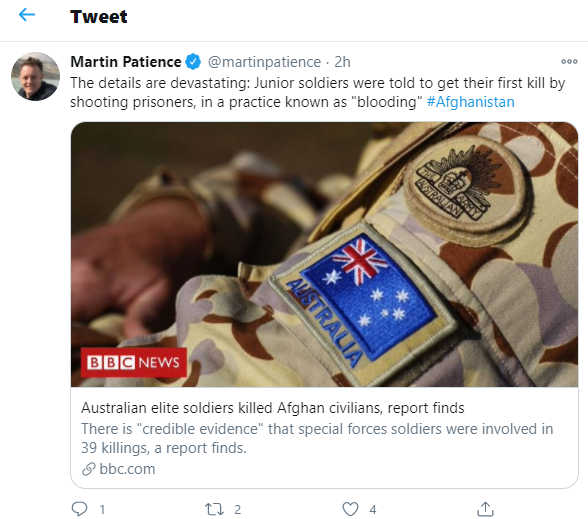An official report from a four-year inquiry organized by the Australian Defense Force (ADF) to investigate accusations that involved some Australian elite troops who took part in the unlawful killings during an armed conflict in Afghanistan between 2005 and 2016 has finally been released. The findings show that about 39 Afghan civilians were victims in the unlawful killings perpetuated by 25 special forces soldiers serving in Afghanistan at that time. According to Australian Defense Force chief Gen. Angus Campbell, none of the 39 alleged unlawful killings happened in the heat of the battle. The ADF recommends that the soldiers be investigated by Australia’s Federal Police.

CNN: One alleged incident is referred to in the document as “possibly the most disgraceful episode in Australia’s military history.”

According to CNN, the Australian Defense Force’s (ADF) four-year inquiry into alleged war crimes in Afghanistan alleges that some patrol commanders, who were treated as “demigods,” required junior soldiers to shoot prisoners to achieve their first kill, in a process known as “blooding.” The report presents what it says is “credible information” that weapons or handheld radios were then sometimes allegedly placed by a body to make it seem like the person had been killed in action.
ADF Chief Campbell said that some of the soldiers who had been accused of war crimes in the report were still serving in Australia’s military.
BBC News: 25 special forces soldiers had taken part in unlawful killings directly or as “accessories”, across 23 separate incidents.

In a similar report by BBC News, the ADF blamed crimes on an unchecked “warrior culture” among some soldiers.
The inquiry – conducted by Major Gen Justice Paul Brereton – conducted interviews with more than 400 witnesses. It also found evidence that:
- Junior soldiers were told to get their first kill by shooting prisoners, in a practice known as “blooding”
- Weapons and other items were planted near Afghan bodies to cover up crimes
- An additional two incidents could constitute a war crime of “cruel treatment”








